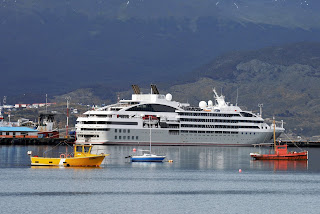This city is the second farthest south inhabited village on the planet Earth, it is called the end of the road as, Argentina Route 3, ends a little west of the city. It was founded in 1884, except that when it was founded, 300 people already lived there as British missionaries had come 15 years earlier. It is hard to know what is anti-British propaganda and what is real in Argentina. The Argentines still claim the Malvinas are theirs despite the fact that they lost a war over them and almost all of the residents of the Falklands voted to stay British. The Argentines claim the vote was rigged and have signs like this on busses, in the airport, on the roads, in the stores, and on the schools
We did not come down here the solve political issues, we came down here to bird and to connect with our trans-Atlantic expedition aboard the LeLyrial, a French ship making an expedition west.
It had rained in this southern terminus of America for something like 50 days. It was 48 degrees as it was always 48 degrees here in the summer, before winter comes in a month or so and they get three feet of snow. For us, the weather cleared and it made for great birding. We spent 48 hours searching the few miles of roads and hiking the trails in the park here which at the few vistas was ran over with buses of day trip tourists from cruise ships. We met lots of European youth on Patagonia hikes and camping trips but on the trails we found not a single human. This was great as it didn't take us very long to find one of the most sought after birds in the Americas...the Magellanic woodpecker. In fact, we saw three.
An impressive bird and the single thump of the male on a tree was the loudest thing i'd ever heard.
We then stumbled upon the local hummer, a green-backed firecrown, which when I heard the chirp, made me think, a hummer...here...? But then we finally saw it and got a photo.
We then made a list, to find, searched for habitat and started ticking birds...
austral parakeets
long-tailed meadowlark
Magellanic oystercatcher
I spotted my lifer penguin, a Magellanic penguin
They have cool geese and ducks down here including this strange flightless steamer duck
they still have glaciers here...
The La Lyrial at port, Ushuaia, March 2, 2019
We would be sailing the Roaring 40s, and as the Bad weather man currently having nice weather, was it the calm before the storm? At least we would eat well, it turned out the captain of our liferaft was the head chef who was introduced as the most important person on a French ship, but who would save the wine? There have been other ships to sail from here, The HMS Beagle twice.
When the then 44-year old light
cruiser the ARG General Balgrano left port in Ushuaia, Argentina in
April 26, 1982, it had already had a long history. The ship formerly known as the USS Pheonix had been at port in Pearl Harbor
on December 7, 1941 when the Japanese attacked and it was not hit. It survived the entire war receiving nine
battle stars and then in 1948 was sold to the Argentine Navy.
On March 3, 2019, our ship the Le Lyrial, entered
the Beagle Channel (one of the three passages between the the Atlantic and Pacific
Oceans and exited it into the Atlantic ocean just as the Belgrano did
bound northeastward towards the Falkland Islands and the start of our expedition and a trans Atlantic croissing.
well, it was good to leave Argentina for us, no matter what happens as our travelling companions, Don and Nancy broke their bathroom, due to a towel drier incident, and it was only a matter of time before our car's brakes failed and we'd roll down a hill into a shop.
Even my penguin Leroy after trying to fly in Buenos Aires, and I was just able to catch him in the nick of time...
Learned that the local ships had some other issues, he is a troublesome penguin...
that Leroy....hopefully he'll keep us out of trouble, as he went birding with us the day we got the hard to get woodpeckers so he has been lucky in the field, but he just hikes a little slow.
I hope our ship has a better fate.
Olaf



















Looks like you'll have to lug Leroy the whole way. Those penguins just can't keep up on land. And I'm pretty sure you won't be swimming much.
ReplyDeletethanks good idea
DeleteWhat a stunner the Woodpecker is!
ReplyDelete